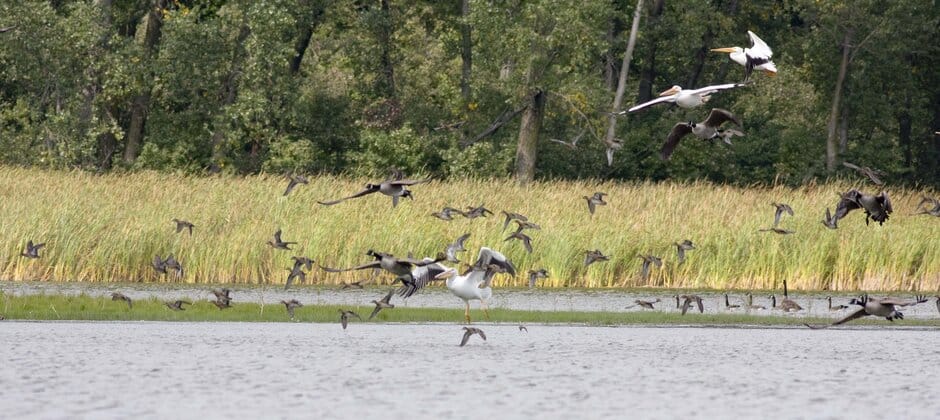Share this article
New administration to review bird, wetland regulations
The Biden administration is reviewing Trump-era rulemaking on laws protecting migratory birds and wetlands.
Recent changes in interpretations of the Migratory Bird Treaty Act and the Clean Water Act reduced the laws’ protections for native birds and isolated wetlands. Due to a recent presidential executive order, all federal agencies must review Trump-era rule changes to ensure they are consistent with the best available science.
Migratory Bird Treaty Act
One of these changes involves what is considered “take” under the Migratory Bird Treaty Act. For decades, the MBTA protected migratory birds against both intentional and unintentional “take,” a term for when birds are harmed, killed or collected. Earlier this year, the U.S. Fish and Wildlife Service codified its new interpretation that the MBTA does not apply to unintentional, or “incidental” take. Now, under the White House directive, the Department of the Interior has suspended implementation of the rule, which was due to take effect on Feb. 6. The rule will undergo an internal 60-day review, including a 20-day public comment period.
The Wildlife Society supports the longstanding interpretation of take under the MBTA and opposed the changes through comments on the proposed rule and its draft Environmental Impact Statement.
Related court cases have also been delayed. Prior to publishing its final rule this year, the Department of the Interior changed its internal interpretation of take, prompting a lawsuit from conservation groups and several states. The resulting court decision invalidated the new interpretation but did not prevent the USFWS from codifying it. Although the Trump administration submitted a notice to appeal the decision, the Biden administration has asked the court to suspend the appeal while it further reviews the issue, according to news sources.
The Wildlife Society continues to work to ensure that the MBTA remains a strong piece of legislation that enables wildlife professionals to effectively conserve migratory birds.
Clean Water Act
The new administration is also reviewing the definition of “waters of the U.S.” — or WOTUS — under the Clean Water Act. This phrase governs which water bodies receive the act’s protections against the discharge of pollution. New rules implemented in 2019 and 2020 restricted the scope of the Clean Water Act by excluding isolated wetlands and other waterways from WOTUS.
In 2015, the Environmental Protection Agency and Army Corps of Engineers expanded the definition of WOTUS to include isolated wetlands and other ecologically important waterways. The rule change was supported by peer-reviewed science and was subject to a rigorous independent review process. The Wildlife Society supported the 2015 definition of WOTUS and submitted comments in opposition to the later rule changes.
A series of pending lawsuits seek to challenge the new rules in court. In response to the White House directive, the EPA and Army Corps have asked the courts to freeze this litigation during a six-month review process and will provide a status update within 90 days.
Read TWS’s letter to the Secretary of the Interior and comments on the 2021 proposed Migratory Bird Treaty Act rule.
Read TWS’s comments on the 2015 proposed Clean Water Act rule and the 2019 proposed Clean Water Act rule.
Read TWS’ Standing Position on The Use of Science in Policy and Management Decisions.
Header Image: The new U.S. administration is reviewing recent changes to regulations that protect migratory birds and inland wetlands. Credit: USWFS/Randy Mays








